
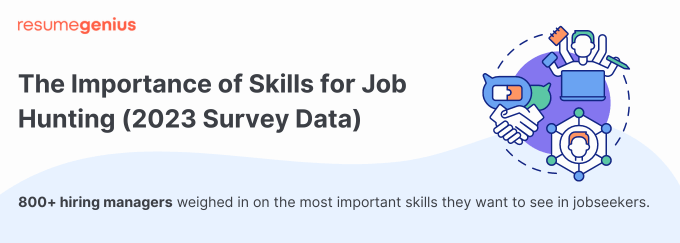
Having the right skills to showcase on your resume or cover letter can significantly increase your chances of success in today’s competitive job market. But it can be challenging to know which skills to focus on when applying for jobs.
To help job seekers understand what types of job skills employers are looking for, we conducted interviews with 812 hiring managers across the United States.
In this report, we reveal key findings on:
If you’re a job seeker, you’ll learn where to prioritize your skill-building efforts so you can gain a competitive edge in your job search.
If you’re an HR professional, you’ll understand what other employers look for in their top candidates so you can make informed decisions during the hiring process and maintain a strong team of skilled professionals.
If you’re an employer, you’ll develop a better understanding of the current job market’s most in-demand skills and how to address skill gaps in your workforce.
IT skills are a hot commodity
As technology continues to push boundaries and reshape the way we work, the demand for skilled IT professionals is at an all-time high.
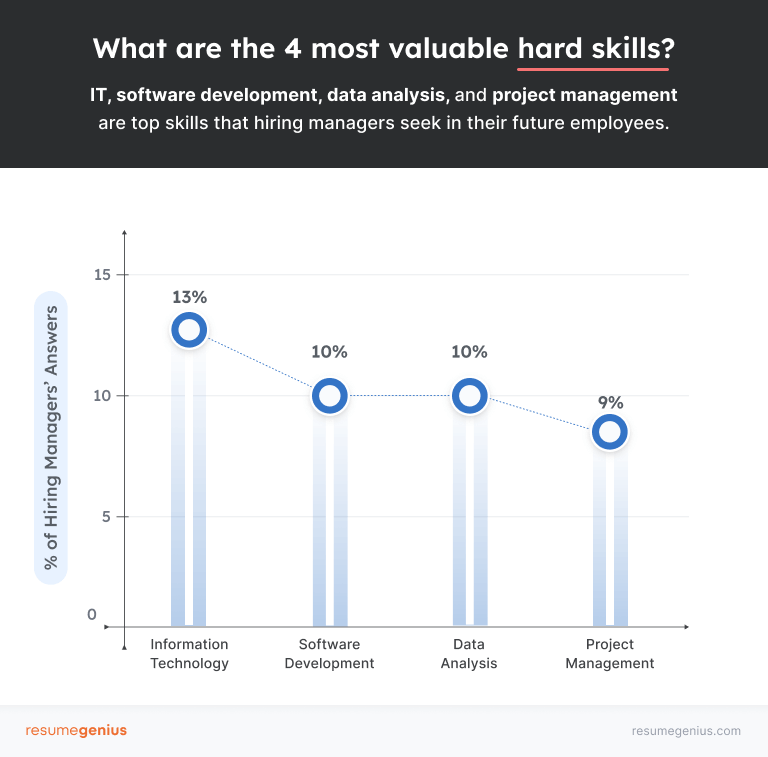
Let’s discuss the key hard skills (abilities learned through schooling or training) that are most valued by hiring managers.
Technical abilities are the most-valued skills of the future
The future is in favor of jobseekers who master technical skills.
According to our survey data, 42% of hiring managers regard IT, software development, data analysis, and project management as the most critical skills for the future job market.
Notably, the combination of software development, IT (which includes blockchain, cloud computing, artificial intelligence (AI) and cybersecurity management), and web development is considered the most valuable skill set.

Here’s a percentage breakdown of the top technical abilities hiring managers are looking for in new candidates (from highest to lowest):
- IT — 13%
- Software development — 10%
- Data analysis — 10%
- Project management — 9%
Following closely are these additional hard skills:
- Social media marketing — 9%
- Marketing — 8%
- Web development — 7%
- Content creation — 6%
- Public speaking — 6%
- Audio and video production — 6%
Lastly, these technical skills scored the lowest among hiring managers:
- Copywriting — 4%
- UX — 3%
- Search engine optimization (SEO) — 3%
Adapt to the AI era by showcasing a versatile skillset
As AI continues to impact the job market, hiring managers emphasize that technical skills alone aren’t enough — in fact, having a combination of both soft and hard abilities will become increasingly important for staying competitive in today’s evolving job market. Here’s what employers think:
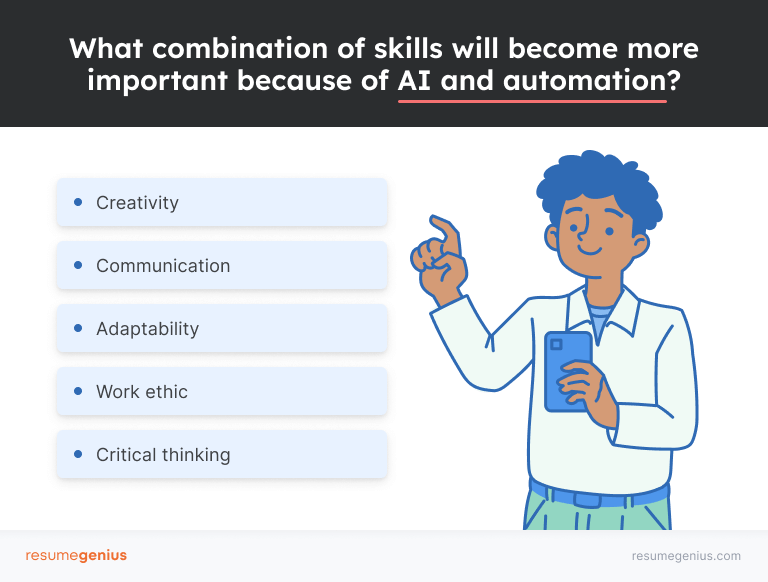
Our research pinpoints the top five skills employers highly value in light of the rise of AI and automation:
- Critical thinking
- Creativity
- Adaptability
- Communication skills
- Good work ethic
These findings also reveal varying preferences across different company sizes and roles:
- 88% of full-time hiring managers are more likely to focus on hard skills when reading resumes
- When hiring for technical roles, hiring managers prefer applicants with a 75% hard skills to 25% soft skills ratio
- Large and small companies value hard and soft skills equally for technical roles. However, medium-sized companies are more attached to hard skills exclusively
- Junior team members involved in hiring are more receptive to a 50/50 hard and soft skills balance for technical roles than their senior peers
- Although hiring managers consistently consider both soft and hard skills on resumes, hard skills are still the primary focus when deciding whether a candidate is right for the job
Soft skills are required to succeed in today’s workforce
Core soft skills (qualities that help you relate to others in a professional setting) are increasingly becoming recognized as valuable assets for employees in today’s workplaces, so you should include them when you write a resume and prepare your cover letter.
Our hiring manager survey uncovered several key insights about the significance of soft skills and how they’re tied to on-the-job success:
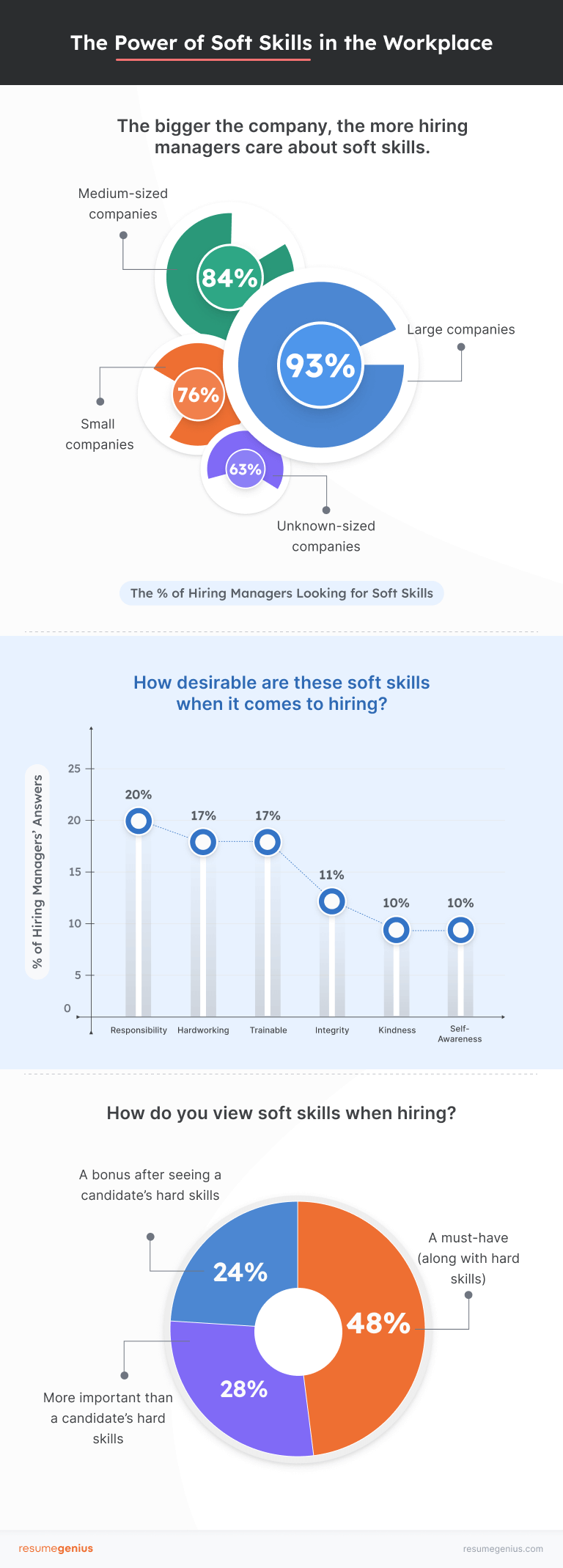
- 48% of hiring managers agree that soft skills are essential for potential employees
- 28% believe soft skills are even more important than a candidate’s hard skills for succeeding on the job
- 24% consider soft skills a bonus after seeing a candidate’s hard skills during the hiring process
The top five soft skills that differentiate the highest performers are:
- Communication — 12%
- Technical-related abilities — 11%
- Leadership — 10%
- Customer service — 10%
- Organizational skills — 9%
Here are some other statistics:
- 49% of female respondents and 47% of male respondents think soft skills are a necessity for career success
- Medium-sized companies (54%) are more likely to think soft skills are critical to have compared to large and smaller companies
- 55% of hiring managers would hire a candidate who has excellent soft skills, even if they don’t have all the required hard skills
- 54% of senior team members who hire new employees are more likely to view soft skills as being essential, compared to full-time HR professionals (47%) or junior team members who assist with hiring (47%)
- When hiring for non-technical positions, hiring managers look for an even balance between hard and soft skills
Communication skills are a game changer and matter more than ever
We examined which soft skills were the most important to hiring managers when choosing a candidate for a role at their organizations, and effective communication abilities were their top choice.
Based on recent findings from Coursera’s Job Skills of 2023 Report, strong communication is essential in hybrid work environments, enabling better connections with customers, smooth internal team guidance, and well-led strategic discussions.
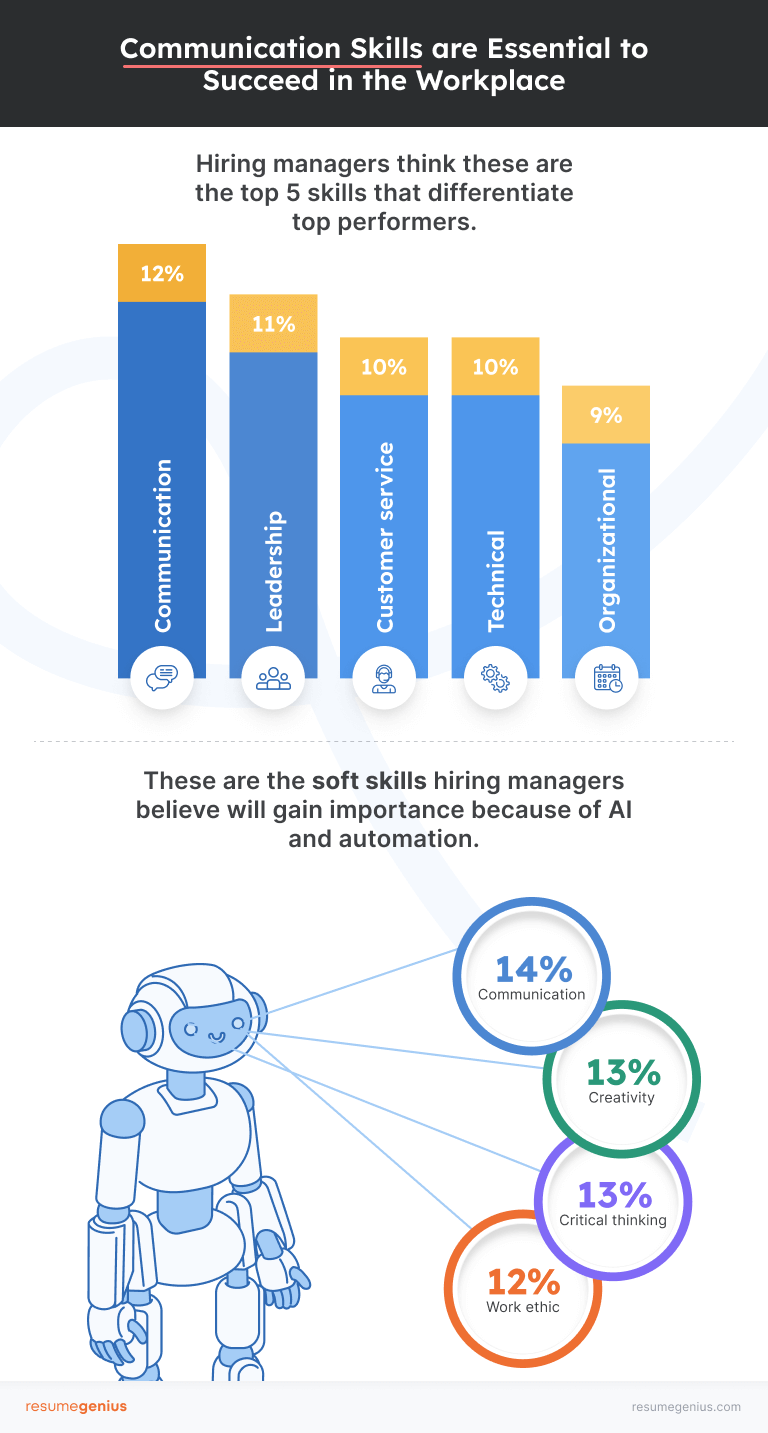
These are the results of our survey:
- Teamwork, communication, and critical thinking form the ideal mix of key transferable skills that hiring managers seek
- Employers identified a combination of communication skills, effective leadership, and excellent time management as the key attributes that set top performers apart from other employees
- 23% of hiring managers want to see both strong communication abilities paired with excellent technical skills in their top performers
Teamwork is crucial in today’s workforce
In a world increasingly shaped by remote and hybrid work arrangements, showcasing your ability to effectively work in a team is key to getting hired and succeeding in your role.
Our report found that excellent teamwork skills are the most sought-after transferable skills that employers seek in potential hires:
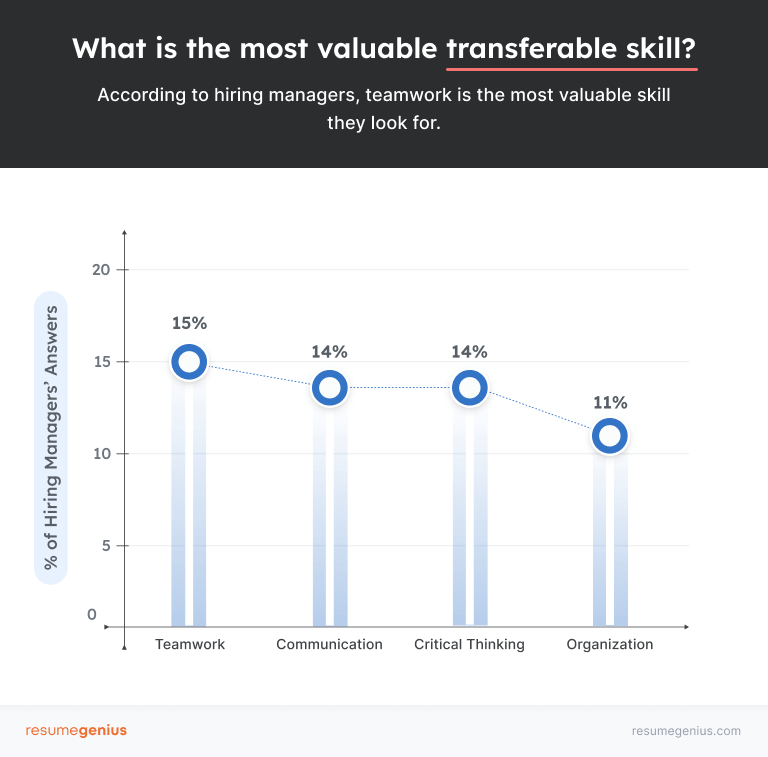
Next, hiring managers chose communication and critical thinking as valuable transferable skills.
Have a look below at the survey data:
- Teamwork — 15%
- Communication — 14%
- Critical thinking skills — 14%
- Time management — 10%
- Leadership — 9%
- Computer-related abilities — 9%
- Foreign languages — 6%
- Research — 6%
- Writing skills — 6%
Responsibility is the #1 trait for an ideal job candidate
Employers want to hire individuals who can be trusted to deliver on their commitments and take ownership of their work.
In fact, 20% of hiring managers believe that responsibility is the most important trait a job candidate can have.
Here’s what we uncovered in our findings about the most desired qualities hiring managers want to see in their candidates (assuming they already have the required hard skills):
- Responsible — 20%
- Hardworking — 17%
- Trainable — 17%
- Integrity — 11%
- Self-aware — 10%
- Kind — 10%
- Enthusiasm — 9%
- Curiosity — 7%
Being vague when stating your skills could cost you the job
Hiring managers have seen it all, including resumes that exaggerate or outright lie about a candidate’s skills and experience. Therefore, being specific and honest about your skills and experiences on your resume is key to avoiding any misunderstandings during the hiring process.
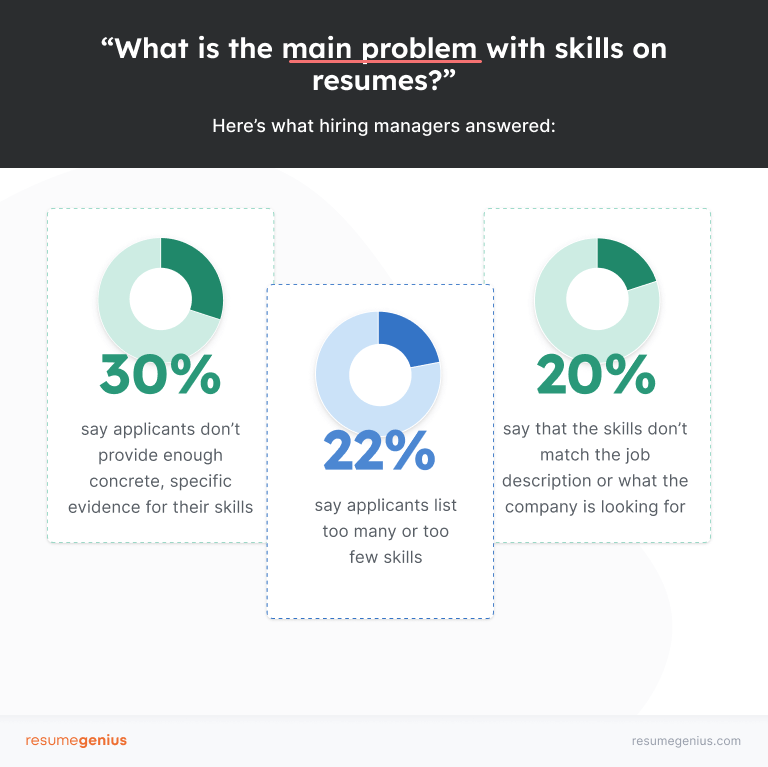
According to our survey data:
- 30% of hiring managers responded that applicants don’t provide concrete, specific evidence for their skills
- 22% of respondents think applicants list too many or too few skills on their resume
- In particular, 33% of senior team members who help with hiring believe applicants list either too many or not enough skills on their resume
- 20% of employers stated the skills listed on resumes either don’t match the company’s job description or aren’t what the company is looking for
Real-life examples of your skills are what’ll impress hiring managers
When applying for a job, simply listing your skills on your resume isn’t enough. To make a lasting impression, hiring managers want to see how candidates have applied these skills in situations beyond their resumes and cover letters.
Interested in how hiring managers learn what skills you possess? Here’s what we discovered:
- 38% of employers understand an applicants’ skill set based on the job references they provide
- 34% of hiring managers judge applicants according to their performances on skills tests during the application process
- 29% of respondents view their candidates’ interview performance as the biggest indicator that they have the skills they claim
- 27% of employers will look closely at an applicant’s resume and cover letter to get a better idea of their skills
Basically, employers use every method they have to confirm you have the skills they’re looking for before they trust you’re telling the truth on your resume and cover letter.
And for hiring managers? According to Raj Mukherjee, Executive Vice President at Indeed, companies that rely solely on traditional recruitment methods like using resume reviews for interview selection, risk missing out on “exceptional talent” in today’s job market because some candidates:
- have gaps in their work history
- live far away from cities where the jobs are
- are from minority groups
- are women
- are over 50 years old
- don’t have a college degree
Mukherjee suggests that companies should change their hiring practices and look for ways (e.g., skills tests, live auditions, simulations) to attract candidates from these underrepresented groups, instead of just relying on resumes and cover letters.
Upskilling is the key to getting hired in 2023
The term “upskilling” refers to the process of gaining new skills or improving existing ones to stay relevant in the job market.
According to our survey, upskilling is highly valued by employers as they seek candidates who aren’t just proficient in their current skill set but are also willing to adapt to new situations and challenges.
Our study reports:
- Male hiring managers (39%) are slightly more likely to reskill or upskill existing employees compared to female hiring managers (35%)
- Junior and senior team members who assist with hiring are more involved with reskilling and upskilling existing employees
How employers are responding to skill gaps
Even with the best recruitment efforts, sometimes finding the ideal candidate with the necessary qualifications and relevant work experience can be difficult. In such cases, employers have to address skill gaps in their workforce.
Here’s what employers have to say about skills gaps in their companies:
- I prefer to hire employees with the right skills — 46%
- I’m willing to reskill or upskill my existing employees — 36%
- I’ll hire contractors or freelancers — 15%
- My company doesn’t have a skills gap — 9%
Additionally, our survey revealed some other noteworthy findings:
- Small companies are more likely to reskill or upskill existing employees
- Larger-sized companies are more likely to hire contractors to close skills gaps
- 44% of managers close skills gaps by hiring new employees with the right skills or reskilling/upskilling employees
Skills-based hiring is transforming the way employers find the right candidates
Rather than just evaluating educational qualifications or work experience, companies are now assessing applicants based on their abilities, also known as skills-based hiring.
For instance, Ernst and Young decided to eliminate degree requirements in 2015 for entry-level jobs, opting to use online assessments to evaluate applicants’ qualifications instead.
And in our study, 44% of full-time hiring managers think with the rise of AI and automation, skills-based hiring through skills tests are the most accurate way to see if applicants have good digital skills.
Here’s what else we discovered:
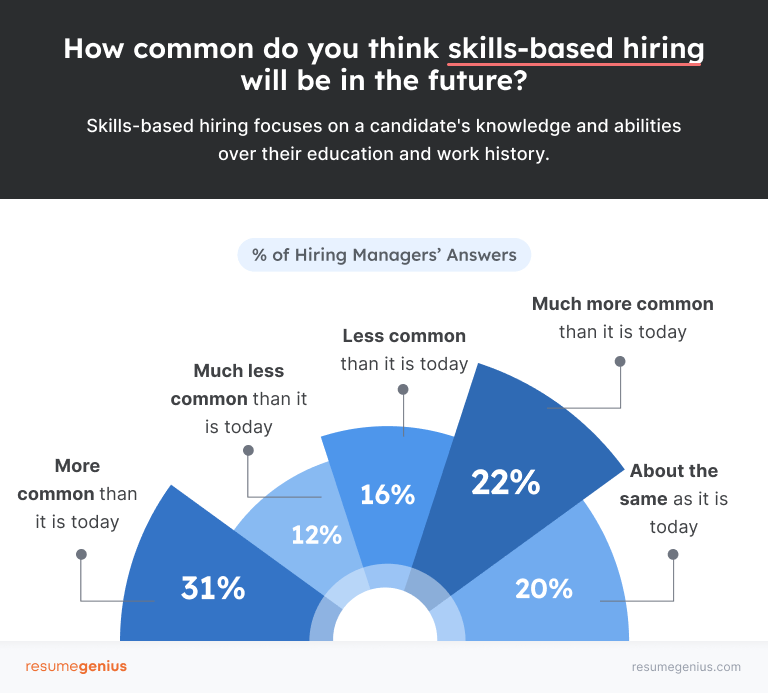
When asked how common skills-based hiring will be in the future, our survey respondents answered:
- It’ll be much more common than it is today — 22%
- It’ll be more common than it is today — 31%
- It’ll be about the same as it is today — 20%
- It’ll be less common than it is today — 16%
- It’ll be much less common than it is today — 12%
Have a look at what hiring managers believe about skills-based hiring:
- “It’ll become more common because of the increasing use of technology, AI, and automation” — 38%
- “Increased diversity, equity, and inclusion-based policies will remove unconscious bias during skills tests” — 20%
- “People switching careers into our industry will be tested on skills tests rather than work education or work experience” — 17%
- “Remote work is opening up our candidate pool so we need more skills tests to weed out candidates quickly and fairly” — 17%
- “I don’t think we need to do more skills-based hiring in the future” — 9%
Other key takeaways from the study include:
- Large (27%) and medium-sized (27%) companies are more likely to believe that skills-based hiring will become increasingly prevalent in the future than small companies (20%) or unknown organizations (13%)
- 33% of full-time hiring managers are more optimistic about the future of skills-based hiring compared to other team members
- There were no significant differences between men (36%) and women (38%) on the reasons why skills-based hiring will become more common
Optimizing your skill set for job success
To enhance your career prospects on your job application documents and during interviews, consider the following tips:
Methodology
The Resume Genius research team conducted a comprehensive survey with 812 professionals from various US regions and company sizes, focusing on skills in the modern workplace.
The survey gathered responses from 446 females and 366 males across different regions in the US, with:
- 154 respondents from the Midwest
- 131 from the Northeast
- 201 from the South
- 222 from the West
Additionally, the study included participants from various company sizes:
- 104 respondents worked at large companies
- 242 at medium-sized companies
- 332 at small companies
- 134 at companies of an unknown size
Respondents held different job titles with:
- 438 identifying themselves as “managers in charge of hiring employees”
- 203 referencing being “members of a team who have helped with hiring before”
- 171 being “senior members of a team who have helped hire new employees”
The study featured a mix of question types, including yes/no questions, scale-based questions related to levels of agreement with a statement, questions allowing the selection of multiple options from a list of potential answers, and open-response questions.
Limitations
The data presented in this study are based on self-reports from respondents, who independently read and answered each question without research administration or interference. We recognize that self-reported data can be subject to various limitations, such as selective memory, telescoping, attribution, or exaggeration.
Sources
- American Institutes for Research (AIR). (2022). Measuring Skills at Work: Lessons from the Field.
- Coursera. (2023). Fastest growing job skills of 2023.
- Deloitte. (2023). The skills-based organization: A new operating model for work and the workforce.
- Wall Street Journal. (2023). Want to Hire Better Amid the ‘Great Realization’? Focus on Skills.
- Fennel, A. (2022). Study: Fake job references and resume lies.
